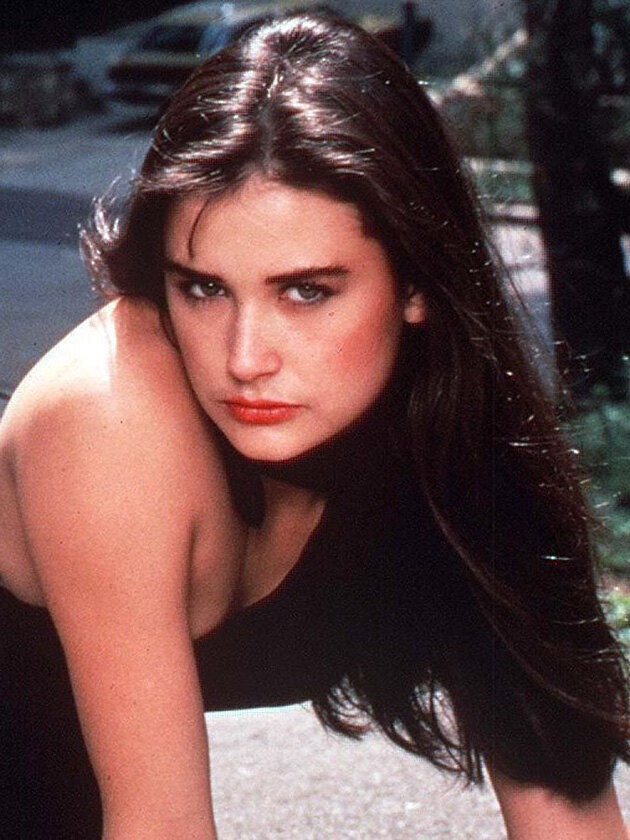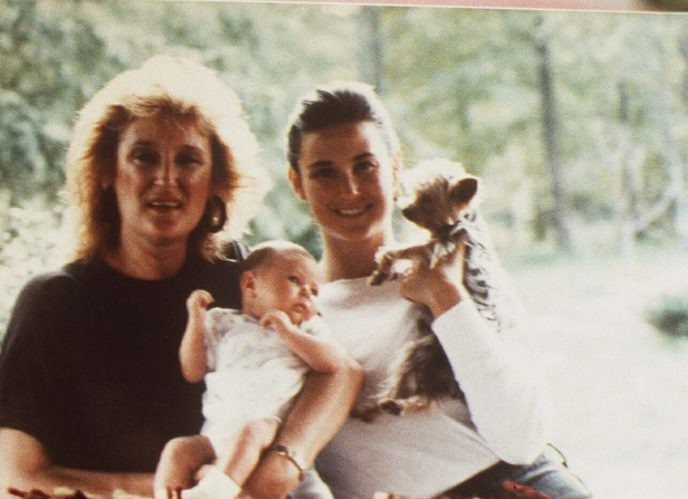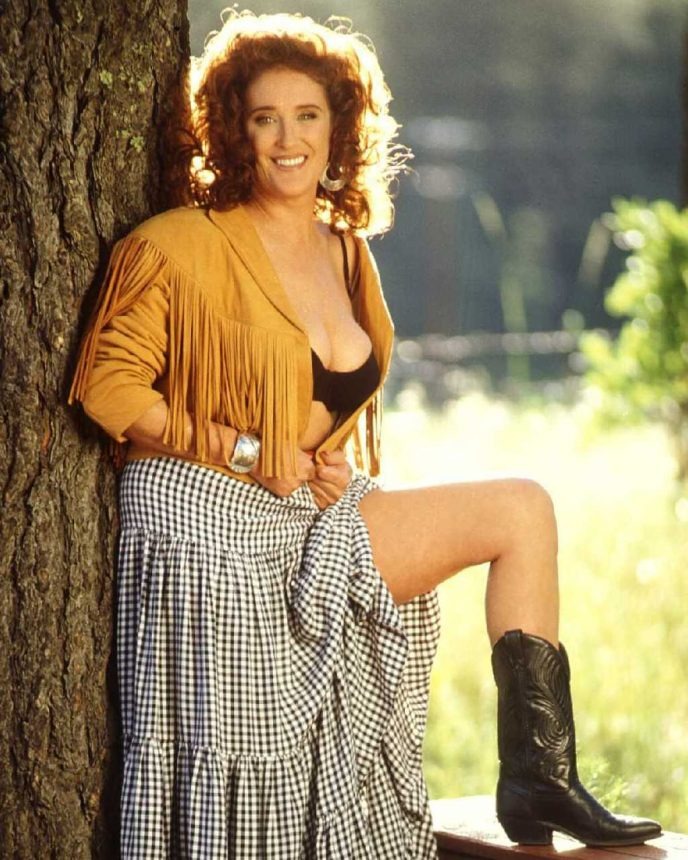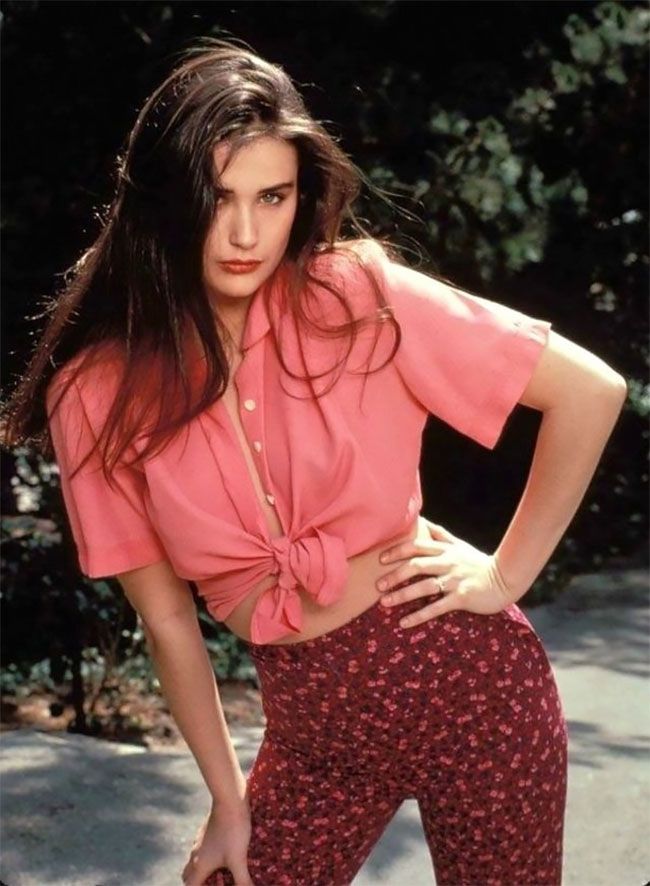Demi Moore has long been known as one of Hollywood’s most captivating actresses — a star whose beauty, charisma, and strength have defined decades of cinema. But behind the glamour and fame lies a story of pain, survival, and extraordinary resilience. Recently, at 61, Moore opened up again about the darkest corners of her past, revisiting memories that shaped her long before she became a household name.
Born in 1962 in Roswell, New Mexico, Moore’s early years were far from the picture-perfect Hollywood dream. Her childhood was marked by instability, poverty, and heartbreak. Her parents struggled to provide a stable home, and her mother’s heavy drinking often led to chaos. For Demi, childhood never felt safe — it felt like a battlefield.
By the time she was 15, she was already thrust into an adult world she didn’t belong in. Tearfully, Moore revealed that her mother would often take her to bars, encouraging her to use her youthful beauty to attract men. “She would tell me to smile, to charm people,” Moore said in one interview, “but I didn’t understand then that I was being used — that I was being made to play a part in her dysfunction.”

What happened next would mark her forever.
“At 15,” Moore recalled, “my mom arranged for a man from the local diner to have access to our home. When I returned one day, I found myself surrounded by strangers.” Her voice broke as she described the event that shattered her innocence and trust. “That day changed everything. I realized the world wasn’t safe. I stopped being a child.”
It was a memory that would follow her through every stage of her life — a wound that shaped the woman she would later become.
By 16, desperate to escape her unstable home, Moore eloped with a guitarist boyfriend. It was a decision born not out of love, but out of a longing for safety — a need to belong somewhere, anywhere. But the comfort she sought didn’t last. The relationship quickly dissolved, leaving her alone once again, barely out of her teens, with the weight of adulthood already pressing down on her shoulders.

In the years that followed, Moore found her way to Los Angeles, working odd jobs while taking acting classes. Her determination was fierce. She wanted to reinvent herself — to build a life that had meaning, control, and purpose. Her big break came in the 1980s, with films like
St. Elmo’s Fire and About Last Night. Soon after, she became one of the most recognizable faces in Hollywood.
Her 1990 film Ghost turned her into a global star. Audiences saw not just her beauty, but the emotional depth that made her performances unforgettable. Yet, even at the height of her fame, Moore carried the invisible scars of her past. Fame couldn’t erase trauma — it only disguised it under lights and lenses.

She later married fellow actor Bruce Willis in 1987, and for a while, it seemed like she had finally found stability. Together they had three daughters — Rumer, Scout, and Tallulah. Moore has often spoken about how motherhood gave her a sense of grounding she had never known. “My girls were my anchor,” she said. “They reminded me what love could be — real, unconditional, healing.”
Though her marriage to Willis ended in 2000, the two remained close friends. They continued to co-parent their daughters with mutual love and respect, something Moore still speaks about with deep gratitude.
But life continued to test her strength.

Years later, Moore married actor Ashton Kutcher, 15 years her junior. At first, the relationship appeared joyful and full of promise, but it soon unraveled under the pressures of fame, betrayal, and personal struggle. “I lost myself,” she later admitted. “I tried to mold myself into someone else’s idea of what love should look like. But it wasn’t me.”
The marriage ended painfully, and Moore found herself confronting old feelings of rejection and inadequacy — the same wounds that had begun in her youth.
Yet even in heartbreak, Moore began to rediscover herself. Through years of therapy, writing, and spiritual work, she found a path toward forgiveness — even toward her mother.
“She did the best she could with what she had,” Moore said softly in a later interview. “It doesn’t excuse what happened, but I’ve learned that holding onto anger doesn’t heal you. Forgiveness does.”
Today, Demi Moore’s relationship with her past is one of reconciliation. She has faced her demons not by hiding from them, but by telling her story — publicly, courageously, and without shame. In doing so, she has inspired others to confront their own pain and find strength in vulnerability.

Her 2019 memoir, Inside Out, became a bestseller, not for its celebrity gossip but for its raw honesty. In it, she didn’t paint herself as a victim, but as a survivor — a woman who learned to turn pain into purpose. “I realized I could either keep running from my past,” she wrote, “or face it and reclaim my power.”
Even as she continues her career, Moore faces new emotional challenges — among them, the heartbreaking reality of Bruce Willis’s battle with dementia. The man who once shared her life, the father of her children, now struggles to recognize her. During a recent visit, Moore reportedly held his hand, speaking softly, though he didn’t seem to know who she was. The moment, she later confided to a friend, left her both heartbroken and profoundly grateful — grateful for the love they once had, for the family they built, and for the time they still have together.
It is this ability — to grieve, forgive, and love all at once — that defines Demi Moore today.

She is no longer the broken girl who was sold for $500 or the young woman lost in Hollywood’s glitter. She is a survivor, a mother, and a storyteller who has reclaimed her voice and her worth.
Looking back, Moore says the pain she endured became the foundation of her strength. “Everything I went through,” she reflected, “was preparing me for who I was meant to be.”
And perhaps that is the greatest lesson of all — that even the darkest past can give birth to light, and that healing is not forgetting, but learning to live fully despite the scars.

Today, at 61, Demi Moore continues to shine — not just as an actress, but as a woman who embodies resilience, grace, and the power of truth.
💫 “I’ve learned that no matter what you survive,” she once said, “you can still choose love.”


